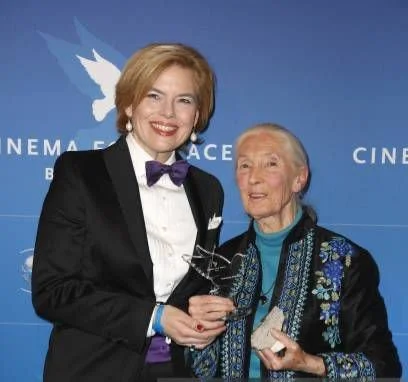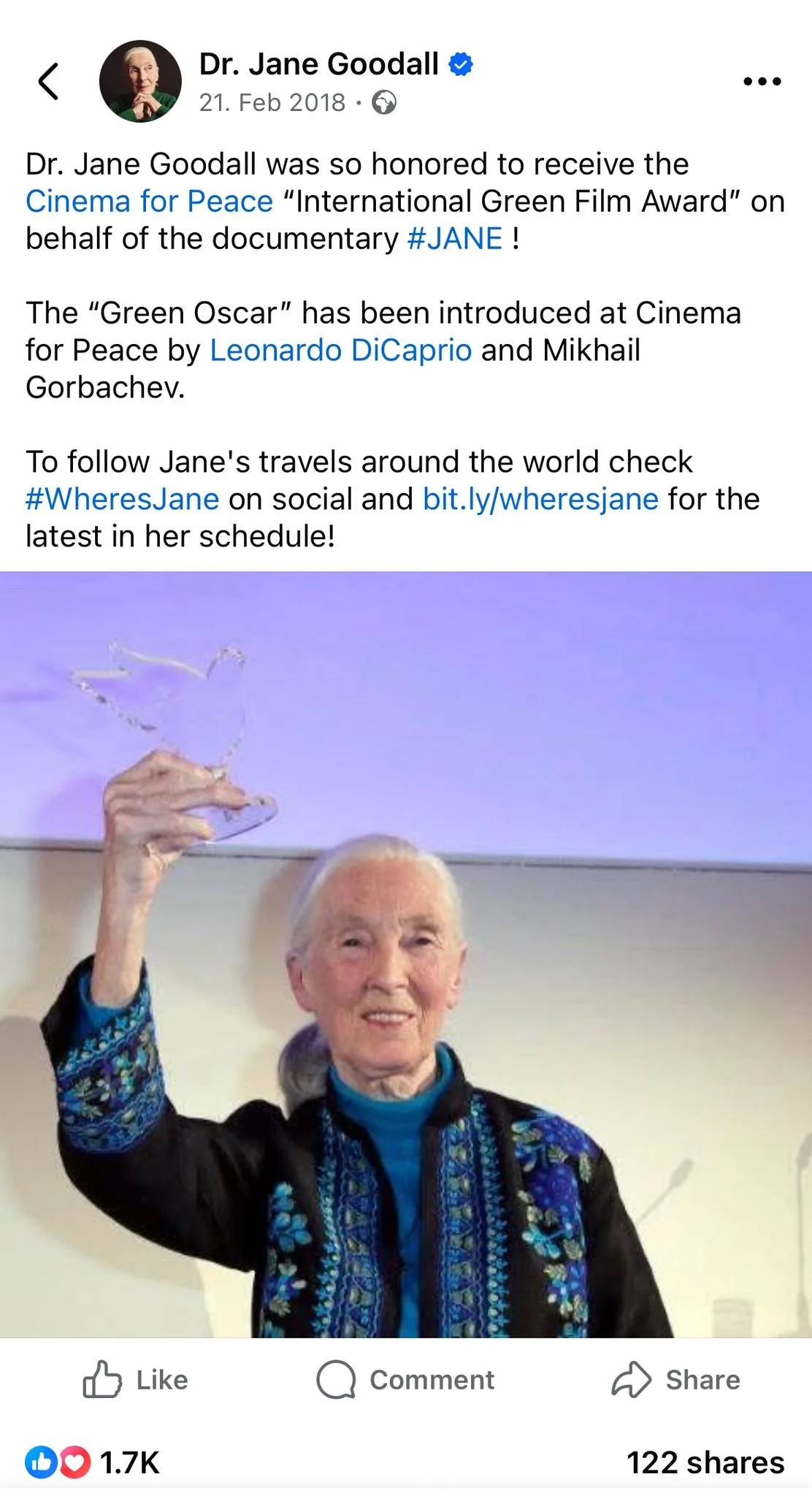Jane Goodall (1934-2025): Champion of Chimps, Hope and Humanity
Two female leaders: President of German Parliament Julia Klöckner with Cinema for Peace honoree Jane Goodall receiving the "Green Oscar"
Los Angeles - Dame Jane Goodall, the pioneering primatologist who redefined our understanding of chimpanzees and humanity's bond with nature, died peacefully on October 1, 2025, at age 91 in Los Angeles during a speaking tour. The Jane Goodall Institute announced her passing, calling her a "true hero for the planet." Our founder, Mr. Jaka Bizilj of Cinema for Peace, met Jane just a week ago in New York during Climate Week with the goal of launching an Environmental Council at The World Forum. On our stage in 2018, she declared the Green Film Award for „Jane“ "the most important film prize I ever received," its honor elevating environmental cinema's voice. In New York last week she was intellectually sharp, her insights as incisive as ever. Both forged in Tanzania, Mr. Bizilj in school, Jane Goodall in the jungle with her chimpanzees, where she proved their functional tool use and our shared realm of conscious action, their bond underscored her timeless bridge building. Her finding at that time was a scientific revolution - humans were not the only species capable to use tools.
In 1960, without a formal degree, she arrived in Tanzania at Louis Leakey's invitation and launched a 60-year study at Gombe Stream National Park. Her observations shattered myths: chimps used tools, formed complex societies, and displayed profound emotions. Naming her subjects like Fifi and David Greybeard, she humanized them, influencing animal rights and conservation globally.
Beyond the field, Goodall's vision scaled worldwide. In 1977, she established the Jane Goodall Institute to safeguard habitats and empower communities. Her 1991 brainchild, Roots & Shoots, galvanized young people in more than 100 countries to confront crises like deforestation and pollution through hands-on projects. As she often shared in her talks, this program is now active in 76 countries with participants from kindergarten through university, and increasingly adults empowers youth to select three projects: one for people, one for animals, and one for the environment. "They roll up their sleeves," she would say, recounting encounters during her 300-day-a-year global travels, where she'd witness kids planting trees, picking up litter, and even challenging their parents, politicians, lawyers, CEOs, to rethink their impact. "The daughter of a CEO can say, 'Daddy, you're not hurting the planet, are you?'" These stories, drawn from her decades of experience, illustrated her belief that change ripples outward: start locally, inspire globally, and transform minds through tailored empathy, not lectures.
Undeterred by age, she crisscrossed the globe into her 80s, delivering over 300 talks a year, her signature optimism a rallying cry: Change begins with understanding, care, and bold action. Passionate about the natural world, loving forest immersion and deeply caring for wild and domestic animals, children, and those suffering in conflicts from Sudan and Gaza to Ukraine, Russia, and Israel, she emphasized that war knows no boundaries, and people on all sides of divides cause harm. "I care desperately," she insisted, urging audiences last week when we listened to her last words: "What you do makes a difference. Every day, we impact the planet so choose wisely." To the depressed who felt powerless as "just one person," she'd counter the adage "Think globally, act locally" as backward: "If you think globally, you'll be depressed and helpless. Think of your own community—what do you care about? Start there, enlist others, and watch the difference grow." Through JGI's work in 26 countries and Roots & Shoots' global reach, she proved this, fostering future citizens, some now in decision making roles who "dare to think and dare to do."
Goodall's story unfolded mesmerizingly on screen, transforming her solitary fieldwork into a cinematic legacy that educated and inspired millions. It began with National Geographic's seminal 1965 documentary „Miss Goodall and the Wild Chimpanzees“. This hour-long special, narrated by Orson Welles, thrust her discoveries and her disarming presence into living rooms worldwide, earning an Emmy and catapulting her from obscure researcher to international icon. Over the decades, she starred in or inspired more than 40 documentaries, from „Animal Planet's Chimps: So Like Us (1990)“, which explored chimp personalities through her lens, to the poignant „Rescued Chimpanzees of the Congo“ (2011), highlighting rehabilitation efforts.
Two films stand as profound milestones. „Jane's Journey“ (2009), directed by David Hess and David Johnson, follows the septuagenarian Goodall on a whirlwind tour, blending archival gems with her urgent pleas against chimp exploitation. Premiering at Tribeca, it clinched the Cinema for Peace International Green Film Award, celebrating film's power to drive environmental advocacy. Then came „Jane“ (2017), Brett Morgen's Oscar-nominated masterpiece, unearthed from over 100 hours of van Lawick's unseen 16mm footage in National Geographic's vaults. Interwoven with Philip Glass's evocative score and Goodall's own narration, it captures her youthful awe amid Gombe's trials, the tool-use epiphanies, the chimp raids on camp, the birth of her son Grub while confronting the era's darker undercurrents, like colonial shadows. In 2018 the film was awarded the Cinema for Peace International Green Film Award again, which Goodall received in Berlin personally, starting her speech on stage with chimpanzee cries!
Even in her final years, Goodall confronted pressing global tensions with unflinching candor. A lifelong vegetarian who advocated ethical treatment, quipping about choosing compassion in all things, she navigated complex figures like Donald Trump and Elon Musk. Trump, the only person to attack her twice on social media falsely accusing her of promoting genocide for highlighting overpopulation on a planet with finite resources, drew her sharp rebuke. Just this week, during his UN speech, he labeled climate change a "con job" and decried Europe's "green energy agenda" as brinkmanship toward destruction. "I find it very strange," she responded last week when we met her, "when you think about what's happening in this one country alone: the frequency and intensity of hurricanes, flooding, droughts, heat waves, fires… Why are we going through all this? It's because the climate is changing, the planet is warming, sea levels are rising, and we're on the brink of disaster. So I find it disturbing when presidents make statements like this." Musk, too, was a "complicated figure": his advancements in electric vehicles, green energy, and batteries advanced her mission, yet his support for Trump whose policies froze USAID funding, costing JGI $5.5 million annually for programs alleviating poverty, educating children, and protecting environments created profound setbacks. "Without question," she said, "his political work has caused more harm," underscoring how poverty drives environmental destruction, from rural timber felling to urban junk food consumption. Humans, she warned, differ from other animals through intellect, yet lack true intelligence by ravaging their home. "Intelligent creatures don't destroy their only habitat," she declared. "Unless enough of us unite our intellects, we're not finding a way - humans are not exempt from extinction.”
Tributes flooded in: Barack Obama praised her as a "towering figure in conservation"; UN Secretary-General António Guterres, "the voice of the voiceless." The institute pledged to honor her by expanding programs and planting trees. In a poignant exchange with Der Spiegel in 2016, she reflected on her unyielding drive: "You once said you could only retire when the world is saved..." to which she replied, "...which means I’ll never retire." Pressed further—"Really?"—she added, "At some point, I’ll probably have no choice but to stop. At some point, my body won’t keep up anymore. But I hope my mind doesn’t fail me then, so I can keep writing." Goodall bridged worlds, urging: "Only if we understand, will we care. Only if we care, will we help. Only if we help, shall we be saved." Her light endures.
“Rescued Chimpanzees of the Congo” directed by Ben Holder
“Jane’s Journey” directed by Lorenz Knauer
“Chimps: So Like Us” directed by Kirk Simon, Karen Goodman
“Miss Goodall and the Wild Chimpanzees” by Marshall Flaum


